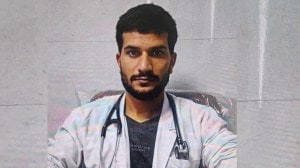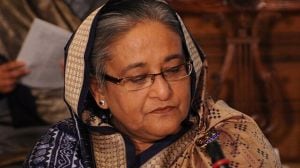No RAFA Slam at Aus Open
Nadals dream to hold all four grand slam titles ends after top seed goes down to Ferrer in QFs
Wednesdays quarter-finals match in the Australian Open was played in Laver Arena,named for Rod Laver,the last man to hold all four Grand Slam singles titles. But Rafael Nadal and Laver will not be sharing a place in the history books after all.
Nadal,the worlds number one player,arrived in Melbourne having won the last three major trophies,but he was beaten in straight sets by his Spanish compatriot David Ferrer in the quarterfinals 6-4,6-2,6-3.
It was unquestionably an upset,yet it was one that eventually began to seem like a foregone conclusion after Nadal sought treatment off-court after the third game for what appeared to be a left hamstring injury. Nadal eventually returned,still looking concerned and apologizing for the interruption to Ferrer,his friend and Davis Cup teammate. But as play continued,it became increasingly apparent that Nadal was limited in his movement and effectiveness.
Its one victory for me but its not like victory really, said the seventh-seeded Ferrer,who will now face world No. 5 Andy Murray of Britain in the semifinals on Friday.
Nadal would finish with just 19 winners and 34 unforced errors in the match,frequently misfiring with his whipping forehands and two-handed backhands and watching some balls sail past for clean winners that he would normally reach.
Ferrer,a relentless baseliner who is one of the best returners in the game,struggled at times to maintain full concentration,but he remained focused enough to keep Nadal from finding much reason for optimism.
A different Rafa
In the third set,Nadal sat forlornly in his chair during a changeover,his chin resting on his hands: quite a different image than the energetic optimism he typically projects. Though he continued to run and go for his shots,by the end,he was fatalistic and did not run for Ferrers last shot on match point.
Its not easy because Rafa is a gentleman and he played with injury as we are friendly, said Ferrer,speaking English in an interview after the match.
I got lucky because he was injured in the first set. I played aggressive,but if Rafael was not injured,I wouldnt have won in three sets, he added after reaching his second grand slam semi-final,and first since the 2007 U.S. Open,a run which also included a win over Nadal.
These last two weeks have been unbelievable. I will try to do my best to win a slam. But Rafa can still win the next four grand slams. Hes one of the top three players in history, Ferrer added.
It was the second straight year that physical problems contributed to Nadals exit at the Australian Open. He also retired in the quarterfinals against Murray last year because of knee problems,but after an extended break,he recovered and won the French Open,Wimbledon and his first United States Open title to finish the season at No. 1.
Nadal said he was not yet certain of the exact nature of his injury but speculated that the virus he contracted at the start of the year may have left him more vulnerable to other physical problems.
I dont have to tell you about what I felt on the court,because I tried my best all the time,but its obvious I didnt feel my best, Nadal said. I had a problem in the match at the very beginning and after that the match was almost over. Thats what I can say, he added.
He spoke about his physical problems reluctantly,and only when pressed,saying he did not want to give the impression that he always has an excuse after he loses. When beaten by Nikolay Davydenko in the semifinals in Doha earlier this month,he explained that he had been weakened by a virus.
Today I have another problem, Nadal said. It seems like I always have problems when I lose. I dont want to have this image.
Even if he had managed to win this Grand Slam tournament,it would not have been a true Grand Slam,which,by general consensus,requires a player to win all four major events in the same season. Laver,the former Australian champion,did it in 1962 and 1969,which was also the last year any man held all four titles. CHRISTOPHER CLAREY



- 01
- 02
- 03
- 04
- 05




























